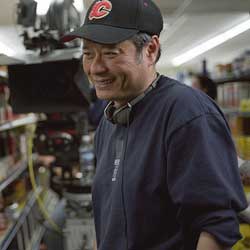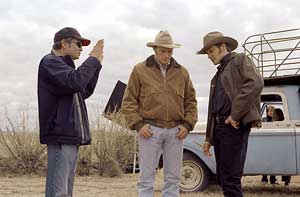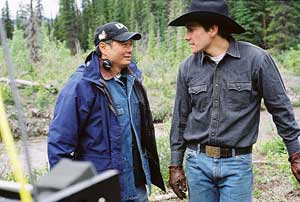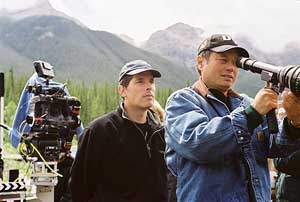 No offense to any big monkeys, but CGI always looks best at home. The astonishing majesty of the American west that Ang Lee captures in Brokeback Mountain demands to be seen on the biggest possible screen.
No offense to any big monkeys, but CGI always looks best at home. The astonishing majesty of the American west that Ang Lee captures in Brokeback Mountain demands to be seen on the biggest possible screen.
Lee is one of the great directors working today, and after a misstep with the murky and confused Hulk he has regained his stride with Brokeback, a touching and wonderful love story – that happens to be between two cowboys.
Lee’s a slight guy, and he talks softly. It’s funny, I had just interviewed his producing and writing partner, James Schamus, moments before, and they couldn’t be any more different. Schamus was loud and jolly and had a silly bowtie on, even at 9:30 on a Sunday morning (seriously, I was at the hotel at 7:45 AM for this one). Lee was just as reserved as his characters, but he still gave great answers to the questions put to him.
Q: What was it about Michelle Williams that made you cast her for this role?
Lee: I saw her in The Station Agent; I never saw Dawson’s Creek. She had a feeling of genuiness, when I met her I just believed she was that part. Unfortunately she was the first one I met and I still had to meet 30 other actresses. I made up my mind when she walked in, and I didn’t know she came from Montana. She’s very close to how I see that person. I think she has a genuine ability, that almost strike me like a child actor – of course she is a more mature, skillful actor – but you can tell her something and she will stare into the eyes straight like a child would, and she will believe in it. She will be in that zone and remain in that zone.
Q: Had you wanted to do a western before?
Lee: It was the script. The script hit me. Of course I can always rationalize why it hit me – I have to talk to people and give an answer. But usually when they hit me I don’t know why. It could be something I was not familiar with, but it hit core emotions with me. Or it could be a subject matter that deeply interests me. When we talk about westerns, Ride With the Devil was a pre-western, this is a post-western. But this happens in a part of America that most people, especially foreign like myself, didn’t know. Didn’t see in movies. Hollywood movies in particular. It’s the other side of America that really was influential to the world, and that strikes me as something interesting. I needed to make a movie to find out more.
Q: Did you relate to one more than the other, in terms of the characters?
Lee: Heath. He’s the anchor man for the movie. And he carries the thing I always carry in my movies – repression. He had more inner conflict. Also I relate to him more because of the way I relate to the movie, he carries the western thing, the thing I was talking about before that’s unfamiliar to some of us. The non-verbal culture, tough and conservative. Fear and violence, that vulnerability and that elegiac mood. He carries all of that so to me he’s the man I identify with. He’s more of the macho lover, too, with more confusion. With Jake I feel he carried more of the movie part, the romantic love story. For me he’s one of the classic American leading men – dreamy, romantic, with bracing emotion and adventures knowingly, smart, bright. He carried that part of the ingredients of the movie. I don’t feel that way, I’m naturally more repressed than outgoing.
With Jake I feel he carried more of the movie part, the romantic love story. For me he’s one of the classic American leading men – dreamy, romantic, with bracing emotion and adventures knowingly, smart, bright. He carried that part of the ingredients of the movie. I don’t feel that way, I’m naturally more repressed than outgoing.
Q: Are these guys gay, or do they fall in love under the circumstances.
Lee: To me they’re gay. Their sexual inclination.
Q: So whether they met or not.
Lee: Whether they met or not, yeah. I think Jack is more obvious, particularly in the movie. In the short story it’s very hard to tell, it’s a mystery, and so is the script. But I think as players, as actors who play them, filmmakers who make them, we need to know. Even though it’s mystery, we need to know at heart and physically what aroused them. I do believe they are sexually aroused and attracted to each other. Even though one particular character, Ennis, denies it.
Ennis is more innocent, but when it hits, it’s very strong. It’s not like he’d tip over to show affection. I think the scene itself is pretty evident that it’s strong, even though it’s confusing to him.
Q: Do you think it’s the first time for both of them?
Lee: Jack, I don’t know if he’s experienced, but he knows. He’s more knowingly from the beginning. That’s how we play it – they come in and check and very aware of the danger, but constantly seeking out how far he can get in, in a very subtle way. But I think he’s the knowing person.
Q: Larry McMurtry said you applied so much to the casting. What do you look for in casting in general, and in this film? What’s the process?
Lee: Usually, if not all the time, I usually seek for good actors. Even if I have ask them to act less and less and less, I love to work with actors. I think I do dramatic types of movies, whether they’re small movies or big action – I am looking for a dramatic trained actor.
I think disposition, the way they look; for cinema they have to carry certain things. Heath has what I was talking about a moment ago. He carried that western thing, that aura. Jake is the romantic leading man type. I want to make sure that when the audience sees them moving around it takes the least amount to prove that they have it. It takes one look and you get a lot.
Once you have your anchor man, you seek combinations. That’s very important.
Q: Gus Van Sant was going to do this film before you did, but couldn’t get actors to sign on. Jake Gyllenhaal turned him down at the time. But now we have heard you had no problem getting your leads. What do you think has changed? Is it the times, or is it that you’re on board, the fact that Gus is gay and you’re not?
Lee: I don’t know. I really don’t know. I think maybe the time is right. I put it aside before, I did the Hulk instead of this. I didn’t regret, but I missed this one, and I’m glad they hadn’t done it.
I think over the years actors – that’s the trend. One movie breaks at a time the barrier. That helped. Gradually they’re more willing to try it out. Of course each movie tries to be more gay, so from family drama to court room drama – I’m talking about mainstream movies, not gay cinema – now name actors are more willing to do it. Not all of them. I think at this point they’re still hesitant to do two in a row, or too much of it. That’s still a concern.
helped. Gradually they’re more willing to try it out. Of course each movie tries to be more gay, so from family drama to court room drama – I’m talking about mainstream movies, not gay cinema – now name actors are more willing to do it. Not all of them. I think at this point they’re still hesitant to do two in a row, or too much of it. That’s still a concern.
Q: This is your second movie where you had your main character as a closeted gay man. What is it about that type of a character that interests you?
Lee: I don’t know. For this one it was mainly the short story that moved me so much. For the first one I did the writing myself. For me that’s the ultimate test to the Chinese filial piety that’s disappearing, that’s my lifetime story. I used an extreme example to examine that change in my life, in my society. That was a tool for me to get into a family drama.
This was such a romantic love story that I had never seen. I just fell in love, I could not deny. They feel very different to me. But I don’t choose to do a gay-related movie because they are gay-related. I would do it again and again if they’re good, but I wouldn’t do it if it didn’t strike me.
Q: Did you have problems getting actors to do The Wedding Banquet?
Lee: Oh yeah, The Wedding Banquet was difficult. Finally I got a flight attendant. He never acted before. He retired and decide to do something with his life. He was a China Airlines flight attendant. He knew some English because he liked to study. I couldn’t get any established actors to do that part, so the film company in Taiwan, they put out the news that anybody could drop their picture, and he dropped their picture! I still made an effort here to talk to whoever dropped their picture, to interview them, but he dropped his picture off and I had him fly – you know, he could fly for free, since he was retired. At that time I thought I would rather train a new person than keep looking, so that was how I spent my time. That’s how it happened.
But now they have no hesitation, they’ll do it after that movie.
Q: Recently Jackie Chan said that the influence of American films is hurting Asian cinema. Do you agree with that?
Lee: That’s actually a big question that cannot be answered the same way he would put it. That’s a phenomena throughout the world, that you really have to struggle to make your mainstream movie. There are always cheaper films to be made – independent movies, festival movies, art films. But the main industry is being hurt a lot because it’s easier for people to watch Hollywood movies.
In the past, people who think they have class would see American movies and people that were lower class didn’t want to read subtitles and would watch Chinese films. They’re sub-Hollywood movies – they’re mainstream but they’re worse made, so to speak. Now that’s gradually disappearing. They cannot compete. Education has gone up. Hollywood is more aware of the world market, and people who care to see movies only see western movies. For mainstream movies there’s no one to compete with Hollywood. There used to be Hong Kong; now Korea is picking up. But it’s very hard for Chinese film to survive. They don’t have an industry. They don’t have movie stars.
But is Hollywood to be blamed? I don’t know. They have themselves to be blamed. But it’s very hard to compete with Hollywood. That’s just the facts of life around the world.
Q: Is there something Hong Kong can do to reclaim the top spot?
Lee: They have to get into the Chinese market. That’s three times bigger than the English speaking population, and they’re doing that. It’s hard because it’s been Communist for a very long time – they block out the commercialism for a very long time. They don’t have genre, they don’t have that culture. Then Hollywood goes in and they see everything – where do they build it from? There’s no common language, no film language there yet. No genres. They have to adapt American genres, but they can’t, because it’s China and not America. It’s very hard to establish – over time, I think, gradually… television series are very popular, but getting somebody to the movie theater is very difficult. Therefore you have extremely small shoestring budget movies, independents, which nobody cares to see except festivals, or Kung Fu Hustle, Crouching Tiger, Jackie Chan. It’s got the two extremes, there’s nothing in the middle.
Q: How do you go about choosing your projects? Are you consciously jumping around  genres, since the differences between your films have been astonishing.
genres, since the differences between your films have been astonishing.
Lee: After the first three or four movies, I do think I needed to break away from being stereotyped in a certain genre. It’s more of a breakaway than a checklist of certain genres I have to do. I do enjoy the fact that I always have to learn how to make movies – it’s the best film school for me, I could never get tired of it. Not only genres, but different feelings in the material. It’s a great pleasure to work with different kinds of filmmaking. It teaches you so much.
Q: So you rediscovered a love of smaller filmmaking here after your bigger films?
Lee: I know a lot about filmmaking, and it’s hard to pretend that I was a virgin on my first movie again. But that is what I did, and it wasn’t even pretend. I was totally beat by my previous movies, I was so sick and tired and exhausted by everything. Not so much filmmaking but what comes along with filmmaking. Filmmaking is the tip of the iceberg – to support filmmaking there are lots of social obligations; you have no life. That’s the part that drowns me.